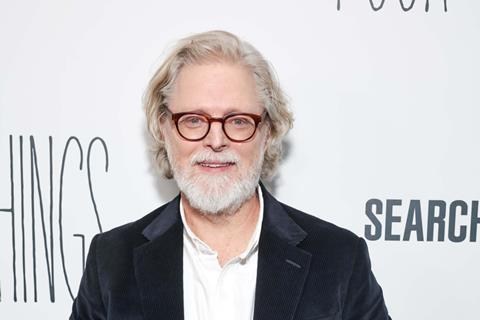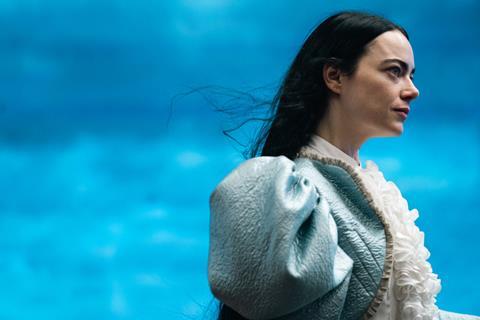
Tony McNamara is speaking to Screen International the day he receives a Bafta adapted screenplay nomination for Poor Things — but he shows little sign of being fazed by the accolade.
”It’s a good day,” he drawls with a sheepish shrug, seven hours after the nominations are announced, but that is as giddy as he is willing to be. Still, maybe McNamara is getting used to Poor Things fever. Yorgos Lanthimos’s film won the Golden Lion when it premiered at last year’s Venice Film Festival, and it has been gathering awards nominations ever since, including 11 each at the Oscar and Bafta film awards. Global box office for the Searchlight Pictures release is an encouraging $51.1m at press time — and with plenty of road left ahead of it.
McNamara’s primary response to the acclaim and success is relief. “It’s a pretty out-there film,” he says via Zoom from his home in London. “We thought we were making something great, but at the time it was hard to even explain to people what it was, so we didn’t know what the reception would be.”
Poor Things is undoubtedly out-there, even by Lanthimos’s adventurous standards. A raucous satirical fantasy, the film revolves around a young woman, Bella (Emma Stone), who is brought back from the dead by a mad scientist (Willem Dafoe), and then romps through a steam-punk version of Victorian-era Europe, stepping into her own power and sexuality. Still, in some respects the film is more mainstream than the source novel, a Scottish modern classic by Alasdair Gray that was published in 1992.
“Yorgos gave me the book, I read it, and I was like, ‘This is crazy. How am I going to do it?’” recalls McNamara. “Half the book was about Scottish nationalism. But I was up for the challenge. I’d never adapted a book before, so I thought, why not begin by adapting one that seems ridiculously hard?”
This was in “2016 or 2017”, says McNamara, “two or three years” into his work on Lanthimos’s previous film The Favourite, which also starred Stone. Before that, he had been a playwright, screenwriter and director in his native Australia. One of his plays was The Great, a flagrantly inaccurate account of the reign of Russia’s Catherine the Great, which he would eventually turn into a Hulu television series starring Elle Fanning and Nicholas Hoult.
Meanwhile, Lanthimos had become attached to a film about the court of Queen Anne, scripted by UK writer Deborah Davis. The filmmaker was looking for another writer to revise it, and knew he had found a prime candidate when he was shown McNamara’s script for The Great, with its irreverent upending of period-drama conventions. Ultimately, the screenplay for The Favourite, jointly credited to McNamara and Davis, would win a Bafta and be nominated for an Oscar.
Meeting of minds

“We just get each other,” says McNamara of his partnership with the director. “We have a similar sensibility. Yorgos tells the story that the producers [of The Favourite] set up this big Skype meeting when I was in Australia and he was in London, and at the end of the meeting he walked back out through their office. It had only been 12 minutes. They were like, ‘Did it all go wrong?’ And he said, ‘No, it’s fine.’ It was that lucky thing where you meet people and it just works.”
This likemindedness was evident when McNamara and Lanthimos moved on to Poor Things, and had to choose which parts of Gray’s novel to keep and which to discard. For instance, they immediately agreed that while the book is largely narrated by the men in Bella’s life, the events in the film should be seen through her eyes, not theirs. “That was a blessing,” says McNamara. “The process of adaptation is about leaving behind the original material on one level, and I think that telling the story from the inside, from her perspective, using her language, gave me the freedom to adapt it quite quickly into a movie rather than grapple with the novel.”
Similarly, he and Lanthimos agreed to scrap the various postmodern framing devices that Gray employs, such as the pages of mock-academic debate over whether Bella’s story is fact or fiction. “When I first read the book, I thought there could be a postmodern version of the film, but it would be too intellectual,” says McNamara. “It would take us away from the emotion of the story.”
The heart of the narrative, they decided, would be its heroine’s mental and emotional progress from innocent child to experienced woman — and that came with its own challenges. “The hard part was working out how her evolution would be reflected in where we were and how she spoke. She was always making up words, so we had to make sure the evolution of her dialogue was meticulous, and that you didn’t ever feel she was saying the wrong thing.” It was important to finalise Bella’s vocabulary — “furious jumping”, in the case of sexual intercourse — before shooting began. “Yorgos is very precise when we get to the end of the writing process, because he doesn’t change anything on the floor, so the script has to be bang-on.”
Nonetheless, the job of developing screenplays with Lanthimos can be a leisurely one. “I think people’s perception of him is that he’s very particular, but it’s a very calm, very creative process,” says McNamara. “It’s a lot of lunches and a lot of chatting, and working through the script line by line, and getting it better over the years. And he’s never in a hurry, that’s the other thing. He’s always like, ‘It’ll be ready when it’s ready.’ There’ll be six months where we don’t even see each other or talk about the script because he does other stuff and I do other stuff, so when we come back we’re pretty fresh.”
In McNamara’s case, the other stuff includes The Great, which ran for three 10-part series from 2020 to 2023. He also co-wrote the screenplay for Disney’s Cruella, another vehicle for Stone. Is it a coincidence that all of these projects are the coming-of-age stories of young women resisting exploitation? “I didn’t set out to do it consciously,” says McNamara. “But I was drawn to those stories, so I guess the coincidence is me.”
He and Lanthimos are working together again on an adaptation of The Hawkline Monster, a 1974 novel by Richard Brautigan, which McNamara calls “a psychedelic western”. Will Stone be in it? “She could be, she could be. It’s not for me to say.” He is also writing a comedy for director Jay Roach and a limited series starring Hoult, both of which are “sort of about marriage”. It is, he says, “a luxury” to alternate between being a screenwriter who helps to facilitate a director’s vision, and a television showrunner who is in control of his own series.
But having directed two films himself — The Rage In Placid Lake (2003) and Ashby (2015) — he has no plans to direct another. “No, I’ve worked with people who are great directors, and I don’t have the skills. I just try to be a great writer. That’s all. I’ll just be good at one thing.”















![[L-R]: Amanda Villavieja, Laia Casanovas, Yasmina Praderas](https://d1nslcd7m2225b.cloudfront.net/Pictures/274x183/6/4/1/1471641_pxl_20251224_103354743_618426_crop.jpg)









No comments yet